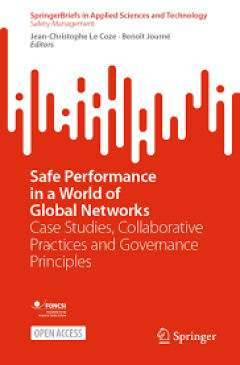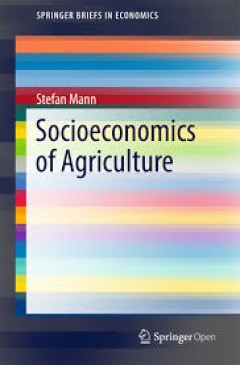Filter by

Safe Performance in a World of Global Networks : Case Studies, Collaborative …
This open access book provides an analytical and critical outlook, by leading scholars, of the impact of various trends in the quality of collaboration and resulting safety outcomes that arise from the evolution of traditional integrated production within a single firm into a complex web of partnerships and supply chains. In the face of increasing fragmentation within industrial production and …
- Edition
- -
- ISBN/ISSN
- 978-3-031-35163-1
- Collation
- V, 106
- Series Title
- SpringerBriefs in Applied Sciences and Technology (BRIEFSAPPLSCIENCES)
- Call Number
- 330 SAF

Safety in the Digital Age : Sociotechnical Perspectives on Algorithms and Mac…
This open access book gathers authors from a wide range of social-scientific and engineering disciplines to review challenges from their respective fields that arise from the processes of social and technological transformation taking place worldwide. The result is a much-needed collection of knowledge about the integration of social, organizational and technical challenges that need to be tack…
- Edition
- -
- ISBN/ISSN
- 978-3-031-32633-2
- Collation
- VI, 137
- Series Title
- SpringerBriefs in Applied Sciences and Technology (BRIEFSAPPLSCIENCES)
- Call Number
- 620 SAF

European Narratives on Remote Working and Coworking During the COVID-19 Pande…
This open access book offers a multidisciplinary and comprehensive perspective regarding the immediate and long-term effects of the Covid-19 pandemic on coworking spaces in the European Region. The current pandemic has imposed several effects on work and spaces for work. Some are immediate effects and will last for a short time (such as the closing down of the space), some will last longer (nam…
- Edition
- -
- ISBN/ISSN
- 978-3-031-26018-6
- Collation
- VIII, 153
- Series Title
- SpringerBriefs in Applied Sciences and Technology (BRIEFSAPPLSCIENCES)
- Call Number
- 330 EUR

Digital and Strategic Innovation for Alpine Health Tourism : Natural Resource…
This open access book presents a set of practical tools and collaborative solutions in multi-disciplinary settings to foster the Alpine Space health tourism industry’s innovation and competitiveness. The proposed solutions emerge as the result of the synergy among health, environment, tourism, digital, policy and strategy professionals. The approach underlines the pivotal role of a sustainabl…
- Edition
- 1
- ISBN/ISSN
- 978-3-031-15457-7
- Collation
- IX, 130
- Series Title
- SpringerBriefs in Applied Sciences and Technology
- Call Number
- IX, 130

Healthcare and Disease Burden in Africa : The Impact of Socioeconomic Factors…
This open access book evaluates African healthcare systems from multiple perspectives. By examining empirical data from various African countries, it analyzes the effects of socioeconomic factors such as urbanization, population growth, and education on various health indicators, including the situation of health professionals, patients's decision making, health resource distribution, mortality…
- Edition
- -
- ISBN/ISSN
- 978-3-031-19719-2
- Collation
- VIII, 136
- Series Title
- SpringerBriefs in Economics (BRIEFSECONOMICS)
- Call Number
- 362 NIO h

A Macroeconometric Model for Saudi Arabia : A Case Study on the World’s Lar…
This Open Access Brief presents the KAPSARC Global Energy Macroeconometric Model (KGEMM). KGEMM is a policy analysis tool for examining the impacts of domestic policy measures and global economic and energy shocks on the Kingdom of Saudi Arabia. The model has eight blocks (real sector, fiscal, monetary, external sector, price, labor and wages, energy, population, and age cohorts) that interact …
- Edition
- 1
- ISBN/ISSN
- 978-3-031-12275-0
- Collation
- XI, 169
- Series Title
- SpringerBriefs in Economics
- Call Number
- 332 HAS m

Quantitative Models in Life Science Business : From Value Creation to Busines…
This open access book explores the field of life science business from a multidisciplinary perspective. Applying statistical, mathematical, game-theoretic, and data science tools to pharmaceutical and biotechnology business endeavors, the book describes value creation, value maintenance, and value realization in the life sciences as a sequence of processes using the quantitative language of app…
- Edition
- -
- ISBN/ISSN
- 978-3-031-11814-2
- Collation
- IX, 127
- Series Title
- SpringerBriefs in Economics (BRIEFSECONOMICS)
- Call Number
- 362 QUA

Music as Intangible Cultural Heritage : Economic, Cultural and Social Identity
This open access book offers an interdisciplinary perspective and presents various case studies on music as ICH, highlighting the importance and functionality of music to stimulating social innovation and entrepreneurship. Intangible Cultural Heritage (ICH) covers the traditions or living expressions proposed by the 2003 Convention for the Safeguarding of the Intangible Cultural Heritage in fiv…
- Edition
- -
- ISBN/ISSN
- 978-3-030-76882-9
- Collation
- XV, 144
- Series Title
- SpringerBriefs in Economics (BRIEFSECONOMICS)
- Call Number
- 306 MUS

Environmental Valuation with Discrete Choice Experiments : Guidance on Design…
This open access book offers up-to-date advice and practical guidance on how to undertake a discrete choice experiment as a tool for environmental valuation. It discusses crucial issues in designing, implementing and analysing choice experiments. Compiled by leading experts in the field, the book promotes discrete choice analysis in environmental valuation through a more solid scientific basis …
- Edition
- -
- ISBN/ISSN
- 9783030626693
- Collation
- XIII, 129
- Series Title
- SpringerBriefs in Economics
- Call Number
- 333 MAR e

Socioeconomics of Agriculture
This open access book applies for the first time emerging concepts of socioeconomics to analyse an economic sector, namely agriculture. It considers the rational choices of all actors in the system (just as agricultural economists do) and their cultural preferences and constraints (just as rural sociologists do). Socioeconomic concepts are subsequently used to structure agricultural issues with…
- Edition
- -
- ISBN/ISSN
- 978-3-319-74141-3
- Collation
- VII, 106
- Series Title
- SpringerBriefs in Economics (BRIEFSECONOMICS)
- Call Number
- 338 MAN s
 Computer Science, Information & General Works
Computer Science, Information & General Works  Philosophy & Psychology
Philosophy & Psychology  Religion
Religion  Social Sciences
Social Sciences  Language
Language  Pure Science
Pure Science  Applied Sciences
Applied Sciences  Art & Recreation
Art & Recreation  Literature
Literature  History & Geography
History & Geography